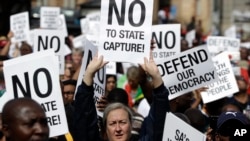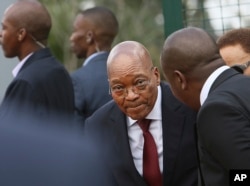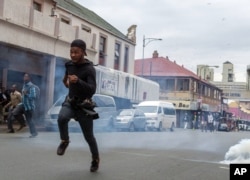South African President Jacob Zuma on Monday accused some protesters of racism after marches last week that drew tens of thousands of people demanding his resignation, while the opposition announced plans for a new protest.
More than 60,000 people marched in South African cities on Friday in largely peaceful protests to demand Zuma quit after a cabinet reshuffle set off the latest crisis of his presidency.
Speaking at a memorial to commemorate the 24th anniversary of the assassination of anti-apartheid and Communist Party leader Chris Hani - whose murder led to nationwide riots - Zuma said South Africa had not yet built a non-racial society decades after white-minority rule ended in 1994.
In his first public response to the protests, Zuma said they "demonstrated that racism is real" in South Africa.
"Many placards and posters displayed beliefs that we thought had been buried in 1994, with some posters depicting black people as baboons," the president said.
"It is clear that some of our white compatriots regard black people as being lesser human beings or sub-human."
A mixed racial profile of people attended the rallies.
Police said about 60,000 people took part in the marches in the major cities.
Opposition leader Mmusi Maimane, head of the Democratic Alliance (DA), which has strong support among white people, had called for a march in Johannesburg, and held a rally of more than 10,000 people.
In the capital Pretoria, about 15,000 people gathered in a field outside the Union Buildings, the site of Zuma's offices, in a march led by civil society group SaveSA. Other marches were held in Cape Town, Durban and other parts of the country.
Maimane's spokesman Mabine Seabe said of Zuma's comments: "He cannot argue based on policy and is trying to distract from the issues by using race as a scapegoat."
Zuma's spokesman Bongani Ngqulunga also said there were posters in Pretoria that depicted black people as baboons.
Ngqulunga sent a picture to Reuters that has been used on Twitter showing a Zuma caricature.
Some placards during the protests used vulgar language against Zuma, Reuters witnesses said.
"It's been proven before that if you place a racial bombshell in a conversation it clouds the issues," said Gwen Ngwenya, the chief operating officer of the South African Institute of Race Relations in Johannesburg."It's an effective spin strategy that's very shrewd ... because it plays on historical racial tensions in South Africa."
New Protest
The DA, the ultra-left Economic Freedom Fighters and other smaller parties announced a new protest march dubbed "National Day of Action" on Wednesday at the Union Buildings, the seat of government, aimed at drumming up support for a no-confidence motion against the president in parliament on April 18.
The African National Congress, which has a commanding majority in parliament, has said its members would vote against the motion.
Zuma's sacking of Finance Minister Pravin Gordhan in a cabinet reshuffle on March 31 has outraged allies and opponents alike, undermined his authority and caused rifts in the ANC, which has governed South Africa since the end of apartheid.
The rand has tumbled more than 11 percent since March 27, when Zuma ordered Gordhan to return home from overseas talks with investors, days before firing him.
Fitch on Friday followed S&P Global Ratings and downgraded South Africa to "junk", citing Gordhan's dismissal as one reason.
On Monday, Zuma said he had met Finance Minister Malusi Gigaba, the Governor of the South African Reserve Bank Lesetja Kganyago and Tom Moyane, the Commissioner of the South African Revenue Service, to discuss the impact of the credit rating downgrades and "how we should respond adequately."
Zuma reiterated plans to transform the economy to include more black people, who, he said, were passed up for promotions and had lower salaries than white people doing the same jobs.
"The majority of black people are still economically disempowered. They are dissatisfied with the limited economic gains from liberation," he said.
Black people make up 80 percent of the population, yet the lion's share of the economy in terms of ownership of land and companies remains in the hands of white people, who make up about 8 percent of the population.







